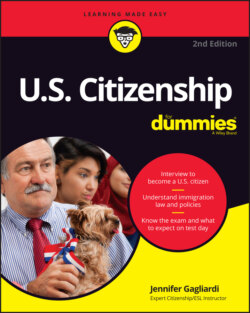Читать книгу U.S. Citizenship For Dummies - Jennifer Gagliardi - Страница 73
Identifying exceptions to the sponsorship requirements
ОглавлениеAs with all things related to U.S. immigration, there are exceptions to most rules, including the family member sponsorship requirements.
If you are the immigrant, and you can prove you’ve already legally worked in the United States a total of at least 40 qualifying quarters, as defined in Title II of the Social Security Act, an affidavit of support is not required. Because rules related to means-tested public assistance benefits changed in October 2021, see the following instructions for updates: USCIS Form I-864W Instructions for Request for Exemption for Intending Immigrant’s Affidavit of Support (www.uscis.gov/sites/default/files/document/forms/i-864winstr.pdf).
If the immigrant is the child of a citizen and if the immigrant, if admitted for permanent residence on or after February 27, 2001, would automatically acquire citizenship under the Immigration and Nationality Act, as amended by the Child Citizenship Act of 2000, they are exempt from sponsorship requirements. Approved in October 2000 by President Clinton, the Child Citizenship Act of 2000 states that a child born outside the United States automatically becomes a citizen of the U.S. when all the following conditions apply:
At least one parent of the child is a citizen of the United States, either born or naturalized.
The child is under 18 years old.
The child is living in the United States in the legal and physical custody of the citizen parent after being admitted as a lawful permanent resident.
It’s important to realize that in order to qualify under the Child Citizenship Act, an applicant must have met all three of the preceding requirements on or after February 27, 2001. If an applicant meets all the requirements except that their 18th birthday fell before February 27, 2001, the applicant legally remains an alien until they can go through the normal naturalization process as outlined in this book.
